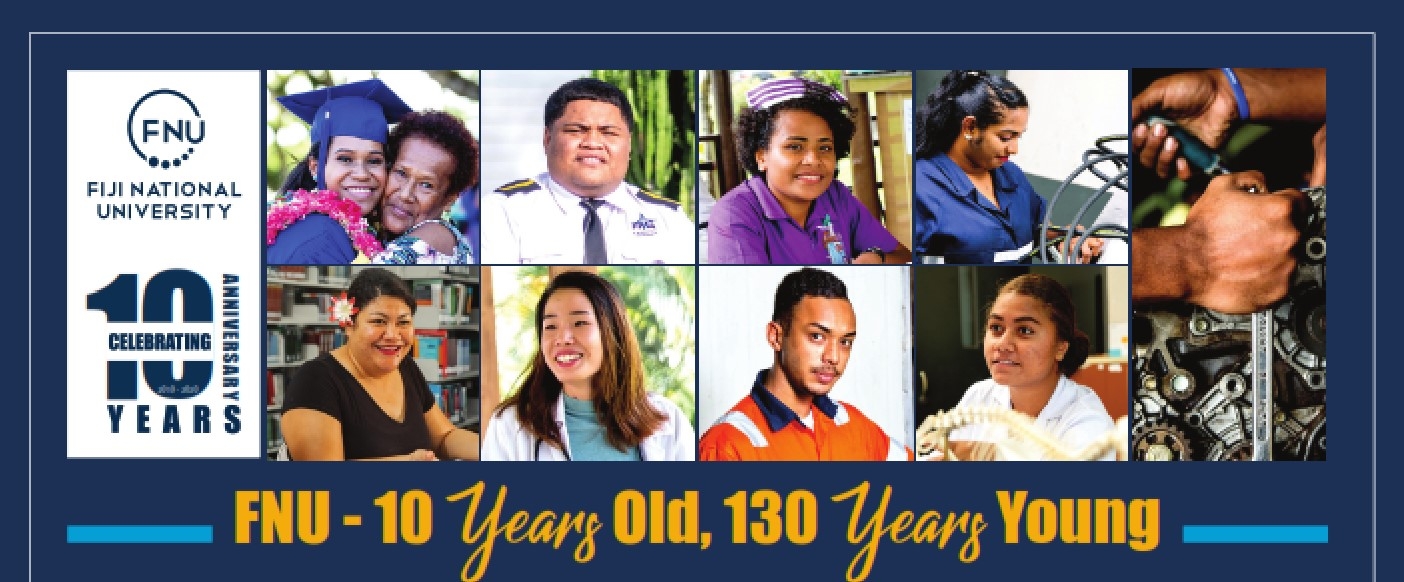Although it was formally established in 2010, Fiji National University (FNU) has a long and colourful history of relevant education dating back to the origins of its component Colleges through institutions that were established according to national needs and aspiration as these developed.
FNU was formally instituted under the Fiji National University Act 2009 (Act 39 of 2009) and commenced operations on 15 February 2010. The formation of a national university for Fiji has since then brought together a diverse range of former national educational and training institutions as one entity and corporate body. The guiding vision of the founding of FNU was to bring strength to a national university that drew from the nation defining legacies in education and training of these originating institutions dating back to more than a century, with a collective age of almost 600 years.
The School of Medicine has developed into the premier medical institute of the South Pacific. It continues to strive towards excellence in the training and education of health professionals who are now serving in key positions in Fiji and overseas. The School which has been in existence since 1886 provides training in most health science disciplines, including medicine, dentistry, pharmacy, physiotherapy, radiography, laboratory technology, public health, dietetics and environment health.
The School of Nursing is one of the oldest nursing education institutions in the Pacific and has been in existence since 1893. The School offers basic and post-basic nursing programmes for Fiji and regional students. Both institutions are now part of FNU’s College of Medicine, Nursing and Health Sciences (CMNHS).
Formerly known as the Fiji Institute of Technology (FIT), the institution is now part of FNU’s College of Engineering, Science and Technology (CEST) and is the University’s Derrick Campus, Samabula. The College provides education to cater for the total human resource needs of Fiji and the South Pacific in the areas of engineering, technology including information technology and electronics, marine training and sciences.
The FIT was also a starting point for the College of Business, Hospitality and Tourism Studies (CBHTS), which is now located in a number of different centres, including the Namaka Campus in Nadi which is the heart of Fiji’s tourism industry.
FNU’s main administrative centre including the hub of its extensive teacher training facility is located at Nasinu Campus. The Fiji College of Advanced Education and Lautoka Teachers College has become part of the University’s College of Humanities and Education (CHE), which is still located at Nasinu.
The Lautoka FNU Campus houses the School of Education and is called the Lautoka Education Campus. The Creative Arts and Journalism section of this College is based at Nasinu Campus.
The Fiji College of Agriculture was established in 1954 and has developed into the University’s College of Agriculture, Fisheries and Forestry (CAFF) at the Koronivia Campus. It places great emphasis on research and provides excellent opportunities for development in agricultural science.
The National Training and Productivity Centre (NTPC) has established the National Qualifications Framework to benchmark training and qualifications in technical and trade areas against a national standard, based on the needs of local industries and is comparable with overseas qualifications. The Centre now runs the University’s short training courses ranging from senior executive level management and leadership to innovative technical courses specifically designed to meet the local industries needs. In January 2020, our national presence took another significant step forward, as we welcomed the Technical College of Fiji into the “FNU Family”.
The COVID-19 pandemic, which has gripped the world, has seen everyone living in unprecedented times. Universities around the world have been forced to innovate and adapt to ensuring that operations run as smoothly as possible with minimum disruptions to our clients – students studies. As Fiji’s national university, FNU has been no exception, and it is a measure of the FNU’s resilience as an institution that these challenges have been met with a spirit of mutual support and cooperation among the Council, Management, Staff and Students. The need to make a speedy transition to entirely online and blended learning has enabled the University to move rapidly through the learning curves in online delivery. This is seen as a means of enhancing the blended learning approach, i.e., a mix of the best of online and face-to- face teaching, that will be the ‘new normal’ for the University’s approach to learning and teaching.
FNU now has campuses and centres at 40 locations (including small centres and TCF) throughout the country, running a total of approximately 300 different courses and programmes with a staff complement of 2000 and a student enrolment of around 26,000.
As a new and dynamic institution, yet one with an illustrious history within its origin institutions, FNU is developing, innovating and expanding daily to provide Fiji and the region with its education and training needs.
This year FNU celebrates its 10th anniversary. We are proud to play an important role in the education and mentoring future leaders. FNU wishes all Fijians in Fiji and those around the world a Happy 50th Independence Day!
